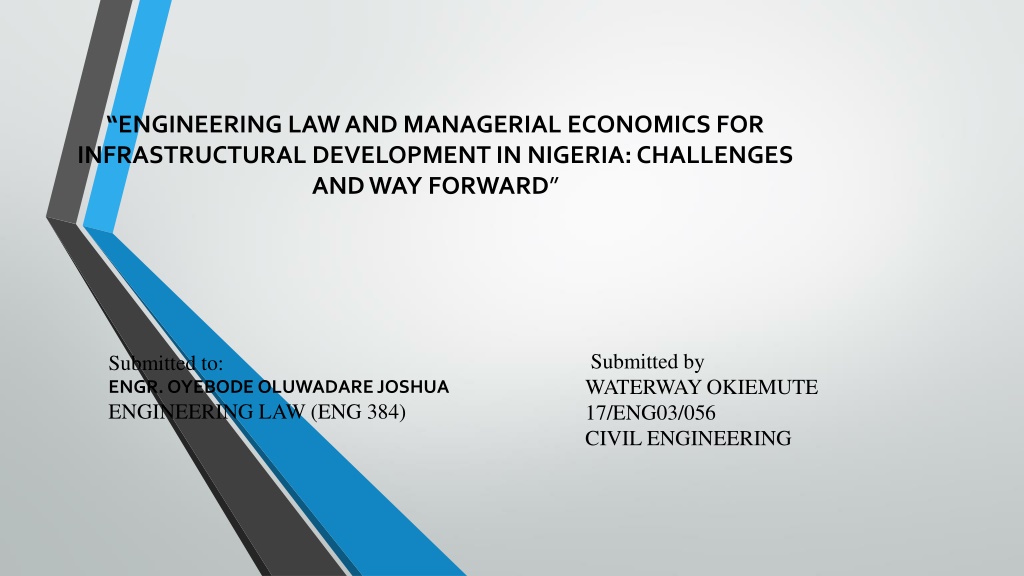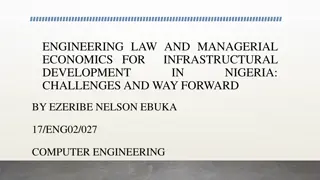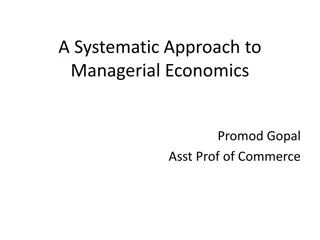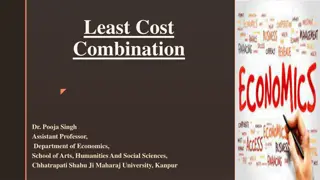Engineering Law and Managerial Economics for Infrastructural Development in Nigeria
Engineering encompasses various activities aimed at creating, exploring, and innovating solutions to societal challenges. This paper explores the roles of engineers in society, the concept of economic development, and the importance of infrastructure development for Nigeria's progress. Challenges and potential solutions are also discussed to enhance infrastructural growth.
Download Presentation

Please find below an Image/Link to download the presentation.
The content on the website is provided AS IS for your information and personal use only. It may not be sold, licensed, or shared on other websites without obtaining consent from the author. Download presentation by click this link. If you encounter any issues during the download, it is possible that the publisher has removed the file from their server.
E N D
Presentation Transcript
ENGINEERING LAW AND MANAGERIAL ECONOMICS FOR INFRASTRUCTURAL DEVELOPMENT IN NIGERIA: CHALLENGES AND WAY FORWARD Submitted by WATERWAY OKIEMUTE 17/ENG03/056 CIVIL ENGINEERING Submitted to: ENGR. OYEBODE OLUWADARE JOSHUA ENGINEERING LAW (ENG 384)
INTRODUCTION What is engineering? Engineering covers many different types of activity. Engineers make things, make things work and make things work better. They also use their creativity to design solutions to the world s problems and help build the future. Engineering has previously been defined by the Royal Academy of Engineering as the creative application of scientific principles , principles that are put in practice to invent, design, build, maintain and improve structures, machines, devices, systems, materials and processes. This definition of engineering is broad, intended to account for the fact that the scope of engineering is continually evolving because of the dynamic nature of engineering-related industries.
What do engineers do? Engineers: Design Create. Explore. Innovate. Engineers receive education and training in many different fields. They work in many different environments. Engineers do things that make the world worthy of living.
Major Roles of Engineers in the Society Technical Social Economic Engineering as a Bridge between Science and the Society
What is Economic Development? Economics can be defined in many ways; following are some of the definitions. Economics is the human Science which studies the relationship between scarce resources and their various uses which compete for these resources. Economics is the study of how society decide what to produce, how to produce and whom to produce. The economic development process supposes that the legal and institutional adjustments are made to give incentives for innovation and for investments so as to develop an efficient production and distribution for goods and services. Economic development is a sustainable increase in living standards that implies increased per capita income, better education and health as well as environmental protection.
ECONOMY DEVELOPMENT IMPORTANCE Quality Education Clean and efficient energy Sophisticated infrastructure Improved social Amenities Increasing phase in GDP per capita Ability of self-production Good economic stability
How can we get there? Previous efforts have tried to use foreign aid, investment in machines, fostering education at the primary and secondary levels, controlling population growth, and giving loans and debt relief conditional on reforms to stimulate the economic growth that would allow these countries to move toward self sufficiency. All of these efforts over the past few decades have failed to lead to the desired economic growth
Roles of Engineer in National Economy The engineering profession makes important contributions to the economy, both from the direct addition to economic output from the work they do, and the contribution of the sectors in which they work. One can also consider the long run return to the economy of improvements in physical infrastructure, in which engineers have played a vital role, and the contributions engineers make to the knowledge economy and to sustainability. Engineers must lead this new industrial economic revolution. There is some excellent leadership by professional organizations such as the institute of electrical and electronic engineers(IEEE), world engineering partnership for sustainable development (WEPSD), world federation of engineering organization (WFED), Nigeria society of engineers (NSE), American society of civil engineers (ASCE), and world business council for sustainable development (WBCSD), among others to make sustainable economic development high priority in engineering and business both in practice and in the education of future engineers.
THE ROLE OF ENGINEERS IN NATIONAL ECONOMIC DEVELOPMENT This has played a vital role in: TECHNOLOGY AND INNOVATION Education Production Construction Information and Telecommunication Foreign Exchange Infrastructure Clean, Sustainable Energy
TECHNOLOGY AND INNOVATION Quality Education with modern days technology: Many developed countries balance and sustain their economy with returns from their institutions and colleges. Efficient Production : Production of goods have been multiplied with less human effort, low cost, and improved qualities. Information Communication and Technology : The rapid growth in ICT and Telecommunication has open doors of opportunities, and in turn boost the economy. Infrastructure: The huge investment in Engineering in Dubai makes it a must go area for luxurious lovers. Development/ Construction: The Engineers deal with the creation, improvement, and protection of the environment, providing facilities for living, industry and transportation, including large buildings, roads, bridges, canals, railroad lines, airports, water supply systems, dams, irrigation, harbors, docks, aqueducts, tunnels, and other engineered constructions within a given region which produces high economic values Clean, Sustainable Energy: Power plays a huge role in any other developments that happen to a country. Stable and sustainable power; stable and sustainable economy.
A lot more now and to come 3 D printing Synthetic biology Brain enhancements Nanomaterial Etc .
AIMS OF AN ENGINEER IN DEVELOPMENT Engineers need to develop broad fundamental understanding of their professional responsibilities in the society. Students in tertiary Institutions need to begin to see themselves more as potential engineering ambassadors and prepare for the challenges of participating in the Socioeconomic activities in the country Since it is difficult for every practicing engineer to participate in the development of national economy, it may be better to localize this experience for professional engineers. Every position you find yourself in the community should be used to showcase the dynamism of engineering leadership in problem solving. The most effective mechanism is the personal involvement of each engineer in integrating the topics of safety and the welfare of the public, professional ethics, legal considerations, environmental responsibilities, quality, and communications into the methodologies which all engineers use to approach and solve problems in the ordinary course of practice. This could be considered a natural extension of "Concurrent Engineering" in which the elements of design, manufacturing, and other issues are considered concurrently in engineering methodology.
Conclusion Every Section of Economic activity has the roles of engineering and technology. Whether it is Raw material, manufacturing or distribution. The Challenges facing country in Energy, Infrastructures and environment are engineering challenges. Engineers must play a much stronger role in the public policy process to provide the right incentives for industry and others to move on sustainable path so that engineers can be encouraged and supported to design sustainable technology for the purpose of economic development that benefits society in a holistic way now and in future Therefore the engineers of 21st century cannot afford to sit back.























